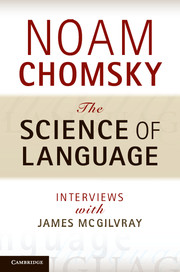Book contents
- Frontmatter
- Contents
- Introduction
- Part I The science of language and mind
- 1 Language, function, communication: language and the use of language
- 2 On a formal theory of language and its accommodation to biology; the distinctive nature of human concepts
- 3 Representation and computation
- 4 More on human concepts
- 5 Reflections on the study of language
- 6 Parameters, canalization, innateness, Universal Grammar
- 7 Development, master/control genes, etc.
- 8 Perfection and design (interview 20 January 2009)
- 9 Universal Grammar and simplicity
- 10 On the intellectual ailments of some scientists
- 11 The place of language in the mind
- 12 Chomsky's intellectual contributions
- 13 Simplicity and its role in Chomsky's work
- 14 Chomsky and Nelson Goodman
- Part II Human nature and its study
- Appendices
- Commentaries
- Glossary
- Bibliography
- Index
9 - Universal Grammar and simplicity
from Part I - The science of language and mind
Published online by Cambridge University Press: 05 June 2012
- Frontmatter
- Contents
- Introduction
- Part I The science of language and mind
- 1 Language, function, communication: language and the use of language
- 2 On a formal theory of language and its accommodation to biology; the distinctive nature of human concepts
- 3 Representation and computation
- 4 More on human concepts
- 5 Reflections on the study of language
- 6 Parameters, canalization, innateness, Universal Grammar
- 7 Development, master/control genes, etc.
- 8 Perfection and design (interview 20 January 2009)
- 9 Universal Grammar and simplicity
- 10 On the intellectual ailments of some scientists
- 11 The place of language in the mind
- 12 Chomsky's intellectual contributions
- 13 Simplicity and its role in Chomsky's work
- 14 Chomsky and Nelson Goodman
- Part II Human nature and its study
- Appendices
- Commentaries
- Glossary
- Bibliography
- Index
Summary
JM: OK, now I'd like to get clear about the current status of Universal Grammar (UG). When you begin to focus in the account of acquisition on the notion of biological development, it seems to throw into the study of language a lot more – or at least different – issues than had been anticipated before. There are not only the questions of the structure of the particular faculty that we happen to have, and whatever kinds of states it can assume, but also the study of how that particular faculty developed . . .
NC: How it evolved? Or how it develops in the individual? Genetically, or developmentally?
JM: Well, certainly genetically in the sense of how it came about biologically, but also the notion of development in a particular individual, where you have to take into account – as you make very clear in your recent work – the contributions of this third factor that you have been emphasizing. I wonder if that doesn't bring into question the nature of modularity [of language] – it's an issue that used to be discussed with a set of assumptions that amounted to thinking that one could look at a particular part of the brain and ignore the rest of it.
NC: I never believed that. Way back about fifty years ago, when we were starting to talk about it, I don't think anyone assumed that that had to be true. Eric Lenneberg was interested in – we were all interested in – whatever is known about localization, which does tell us something about what the faculty is. But if it was distributed all over the brain, so be it . . .
JM: It's not so much the matter of localization that is of interest to me, but rather the matter of what you have to take into account in producing an account of development. And that seems to have grown in recent years.
NC: Well, the third factor was always in the background. It's just that it was out of reach. And the reason it was out of reach, as I tried to explain in the LSA paper (2005a), was that as long as the concept of Universal Grammar, or linguistic theory, is understood as a format and an evaluation procedure, then you're almost compelled to assume it is highly language-specific and very highly articulated and restricted, or else you can't deal with the acquisition problem. That makes it almost impossible to understand how it could follow any general principles. It's not like a logical contradiction, but the two efforts are tending in opposite directions.
- Type
- Chapter
- Information
- The Science of LanguageInterviews with James McGilvray, pp. 59 - 64Publisher: Cambridge University PressPrint publication year: 2012



